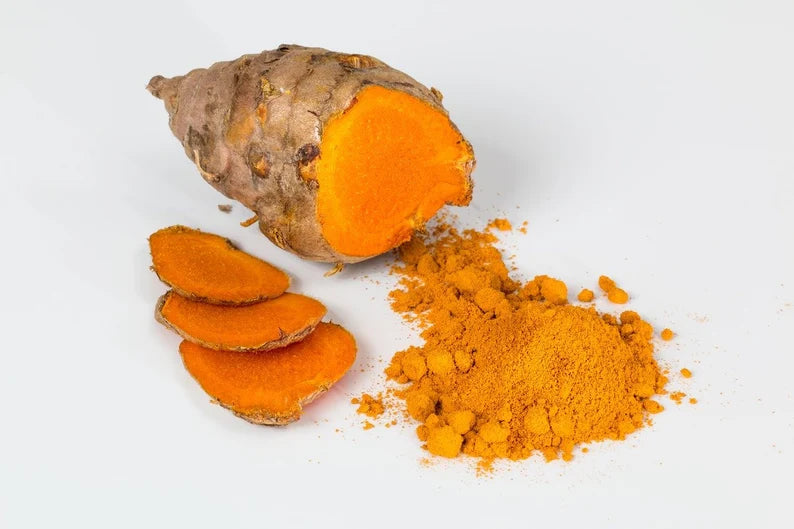Turmeric, a golden-yellow spice native to India and Southeast Asia, has been revered for thousands of years for its numerous medicinal properties and culinary uses.
Derived from the root of the Curcuma longa plant, turmeric is a key ingredient in traditional Indian and Asian cuisines and is a cornerstone of Ayurvedic medicine.
The primary active compound in turmeric, curcumin, is responsible for the spice's vibrant color and myriad health benefits. In this blog post, we will explore the incredible advantages of incorporating turmeric into your daily life and how to harness its powerful healing properties.
- Potent Anti-Inflammatory Properties
Curcumin, the active ingredient in turmeric, is a powerful anti-inflammatory agent. Chronic inflammation plays a significant role in many health issues, including heart disease, diabetes, and arthritis. By reducing inflammation, turmeric can help alleviate symptoms of these conditions and promote overall health.
- Rich in Antioxidants
Turmeric is abundant in antioxidants, which are essential for neutralizing free radicals and combating oxidative stress. These antioxidants can help prevent cellular damage, delay aging, and reduce the risk of chronic diseases like cancer.
- Supports Brain Health
Curcumin has been found to increase levels of a hormone called brain-derived neurotrophic factor (BDNF), which plays a crucial role in learning, memory, and cognitive function. By boosting BDNF, turmeric may help protect against age-related brain degeneration and improve mental health.
- Promotes Heart Health
Turmeric's anti-inflammatory and antioxidant properties can also benefit heart health by reducing inflammation in the blood vessels, preventing plaque buildup, and lowering cholesterol levels. These effects can reduce the risk of heart disease, heart attacks, and strokes.
- Eases Joint Pain and Arthritis
Turmeric's anti-inflammatory properties make it a natural remedy for joint pain and arthritis. Studies have shown that curcumin is effective in reducing pain and improving mobility in individuals with osteoarthritis and rheumatoid arthritis.
- Enhances Skin Health
Turmeric's antioxidant, anti-inflammatory, and antimicrobial properties can work wonders for skin health. The spice can help soothe various skin conditions, including acne, eczema, and psoriasis, and may even help slow down the aging process by protecting the skin from free radical damage.
Incorporating Turmeric into Your Diet
There are several ways to add turmeric to your daily routine. One of the easiest methods is to include it in your cooking. Turmeric can be added to soups, stews, rice dishes, and even smoothies for a burst of flavor and color. You can also enjoy turmeric tea by simmering the spice in hot water and adding a touch of honey or lemon.
To increase the bioavailability of curcumin, it's essential to consume it with a source of healthy fat and black pepper. The fat enhances curcumin absorption, while black pepper contains a compound called piperine, which increases its bioavailability by up to 2000%.
Supplements are another option for those who want to reap the benefits of turmeric without consuming the spice directly. Look for products that contain both curcumin and piperine or are formulated with enhanced bioavailability in mind.
Turmeric's timeless health benefits make it a valuable addition to any diet. Whether you choose to consume turmeric in your meals, as a tea, or through supplements, this golden spice can work wonders for your overall health and well-being.
By incorporating turmeric into your daily routine, you'll be harnessing the power of one of nature's most potent healers.


